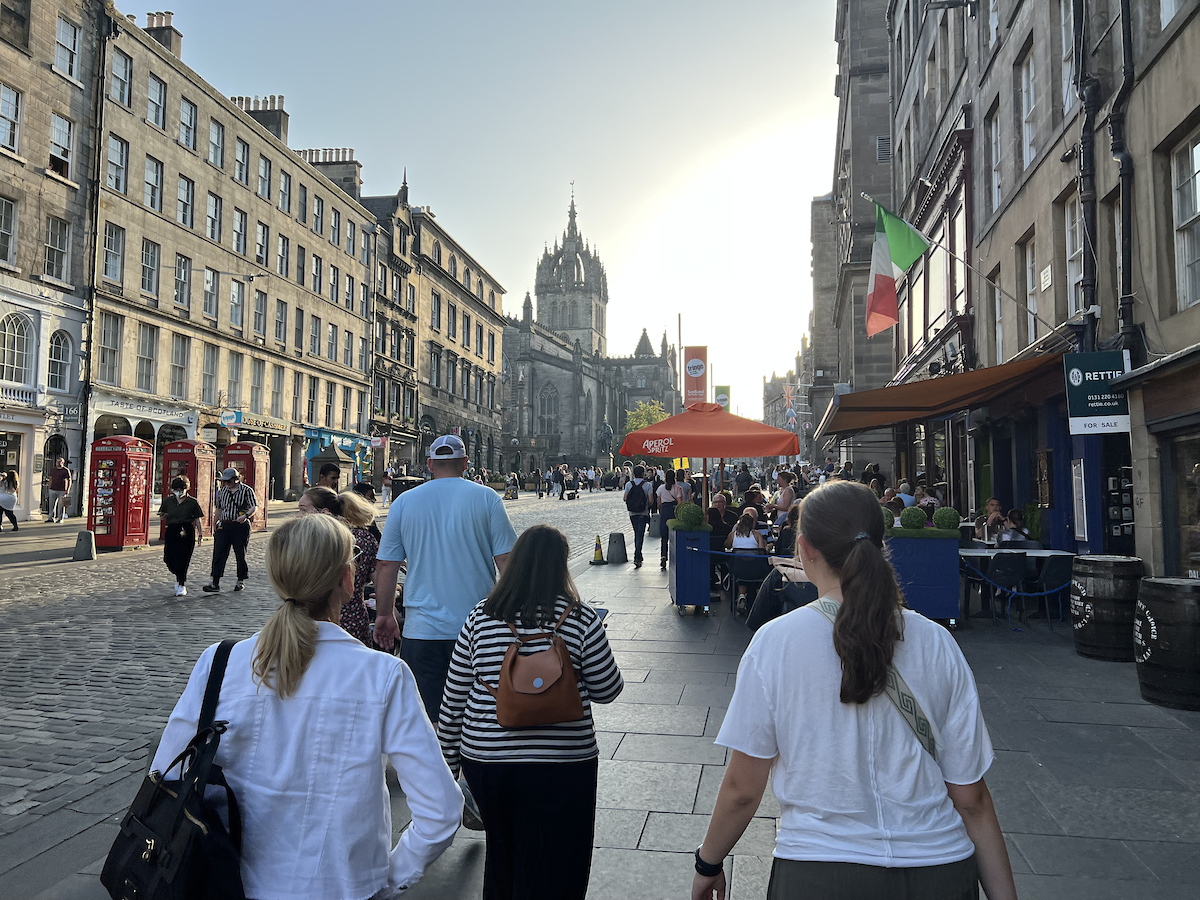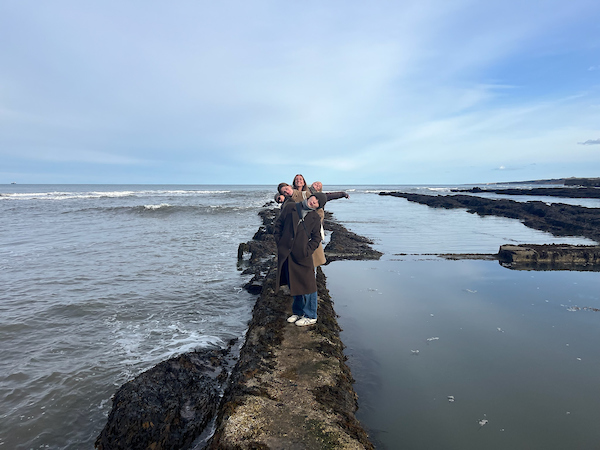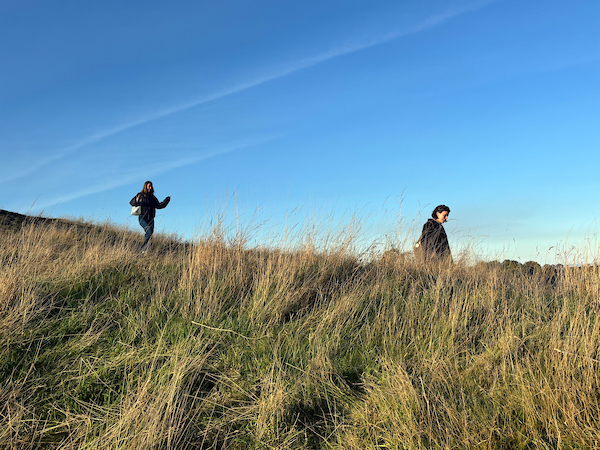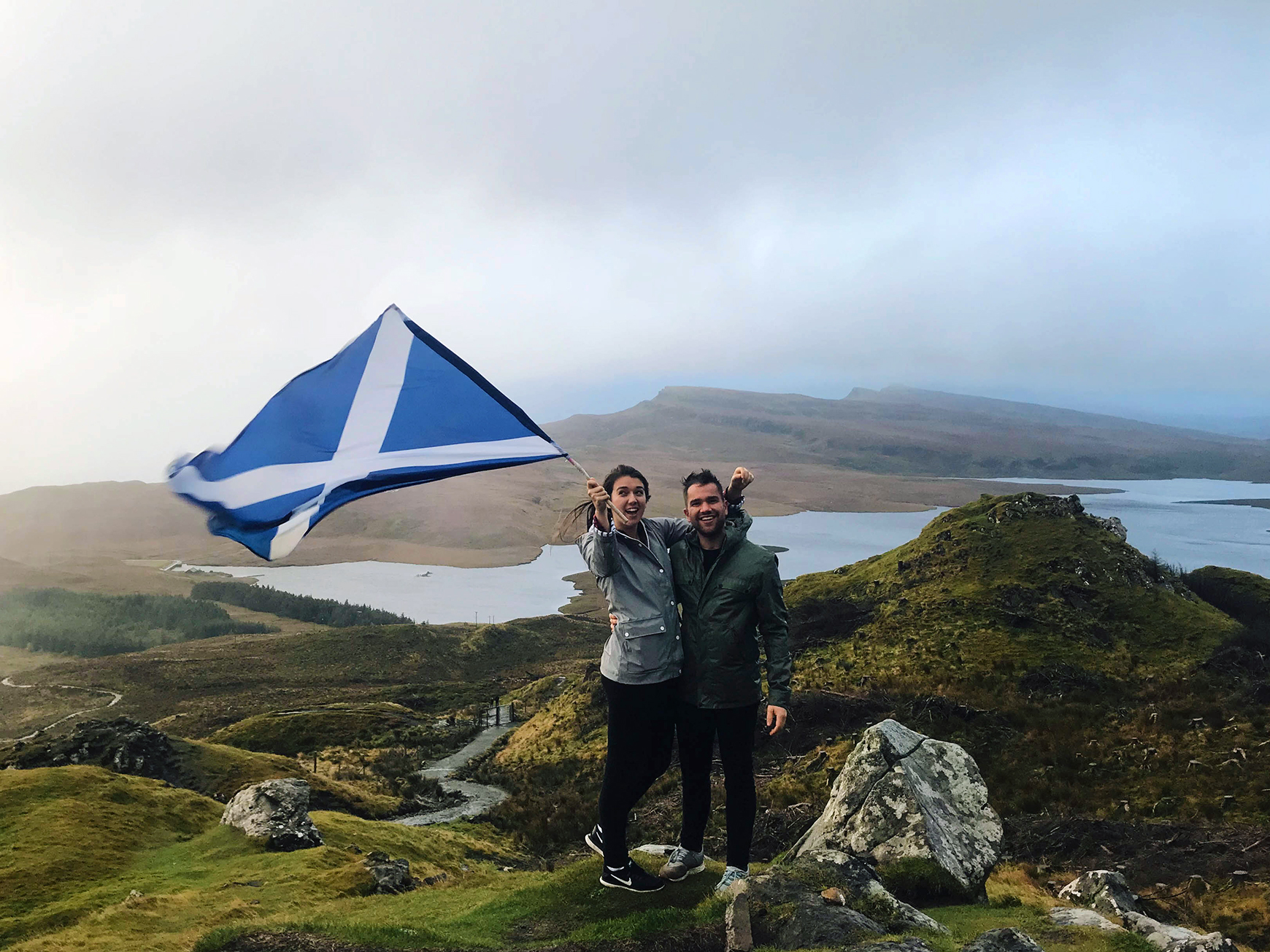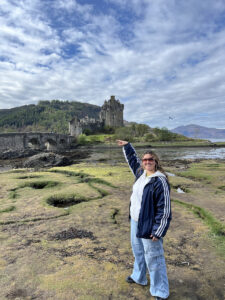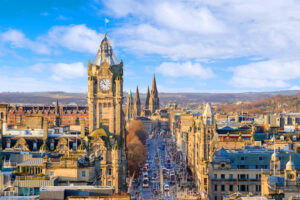Edinburgh, Scotland
IFSA Summer in Edinburgh
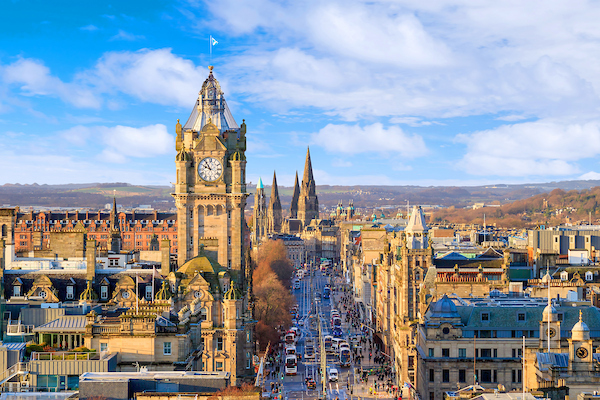

Program Overview
DIVE INTO SCOTTISH POLITICS, LITERATURE, ECOLOGY, AND MORE
Edinburgh’s magnificent blend of striking historic architecture and dramatic natural beauty provides an amazing backdrop for you to explore Scottish culture. Choose one or two six-week sessions to explore your topic of choice in depth.
Along the way, get to know the city from the UNESCO Heritage Sites of Old and New Towns to sprawling green spaces like The Meadows and Arthur’s Seat. Your program also includes a day trip to Glencoe and Loch Ness in the bonnie Scottish Highlands.
This is an exclusive IFSA-Designed Program. Learn more about these affordable programs.
Details at a Glance
Application deadline
Minimum GPA
2.00
Credit load
3–12
Housing
Apartment/Flat
Instruction language
English
Language prerequisites
None
Visa required?
Not in most cases. Learn more.
Academics
This program offers two six-week sessions. Students take one or two classes per session. Enroll in Session 1 or Session 2 or enroll in both sessions for a complete 12-week experience.
Choose unique classes that highlight Scottish history and culture, not typically available at Edinburgh universities.
Session 1
Psychology of Weather
How do weather and climate influence human thoughts, emotions, and behavior? Students examine the psychological effects of seasonal change, extreme weather events, and long-term climate patterns through the lenses of environmental, cognitive, and health psychology. Topics include seasonal affective disorder, risk perception, mood variability, and behavioral responses to weather-related stressors. Emphasis is placed on applying psychological theories to contemporary challenges such as climate anxiety and environmental decision-making. Students engage in observational research, case analysis, and cross-cultural reflection to assess how weather shapes lived experience in diverse environments, including the Scottish context. (3 U.S. semester credit hours)
Scottish History, Culture, and Identity
Explore the history and culture of Scotland from 1707 to the present day. Gain knowledge of major historical events in Scotland, and understanding of Scotland’s role in the United Kingdom, Commonwealth and the global world. Includes an overview of forces that have shaped modern Scotland. The course takes a broad and varied historical perspective, using visual sources, audio narratives and music, contemporary documents, surviving artifacts, and personal testimony, and introduces students to various sources and historical methodologies, considered in relation to key scholarly debates on modern Scottish history. (3 U.S. semester credit hours)
Highland Ecosystems in Scotland
This course explores the structure, function, and conservation of ecosystems in the Scottish Highlands. Students examine key ecological processes, species interactions, and habitat diversity across upland moors, peatlands, freshwater systems, and ancient woodlands. Emphasis is placed on understanding the historical and human dimensions of land use, rewilding, and biodiversity management. Field-based learning and data collection provide students with hands-on experience in ecosystem assessment and conservation analysis. By integrating ecological theory with practical case studies, students develop the skills to critically assess environmental challenges and contribute to sustainable land stewardship in Scotland and beyond. (3 U.S. semester credit hours)
Principles of Negotiation
This course focuses on the skills and techniques of negotiation relevant to a wide range of contexts: from commercial communication to political debate, from public relations to social and public campaigns. Through class lectures and practical simulations, students will explore and compare theories of negotiation grounded in research from the fields of linguistics, psychology, and rhetoric. They will learn to apply a range of written and oral persuasive skills and devices effectively, and to manage a successful negotiation process in a multicultural environment. In addition, the course will include visits. (3 U.S. semester credit hours)
Session 2
Psychology, Power, and Morality
Students examine how psychological, biological, and environmental factors shape harmful human behavior, exploring a range of topics including moral reasoning, obedience to authority, group dynamics, neurological and hormonal influences, and the role of social context in moral disengagement. Drawing from research in social psychology, neuroscience, and ethical theory, we’ll emphasize understanding behavior within complex systems rather than labeling individuals as inherently evil. Through case studies, media analysis, and cross-cultural perspectives, students apply psychological concepts to historical and contemporary events, with a goal of critically evaluating the interplay of individual agency and situational influence, and articulating evidence-based interpretations of how and why people may come to cause harm. (3 U.S. semester credit hours)
Environmental Planning
Scotland’s rich environmental landscape—from rugged highlands and peatlands to lochs, rivers, and its extensive marine ecosystems—presents complex challenges and opportunities for sustainable planning. This course explores the legislative, ecological, and socio-economic dimensions of environmental planning in Scotland, with a particular focus on the marine environment as a critical component of national and international conservation strategies. Students will examine key planning frameworks such as the Marine Scotland Act (2010), the Town and Country Planning (Scotland) Act, and the National Planning Framework, assessing how these tools balance conservation goals with development pressures in both land and sea contexts. Through marine-focused case studies, integrated planning exercises, and stakeholder simulations, students will learn to navigate competing interests and apply evidence-based strategies to promote sustainable environmental outcomes across Scotland’s diverse habitats. (3 U.S. semester credit hours)
Business Tourism
This course examines the global business tourism industry, focusing on the economic, strategic, and operational aspects of corporate travel and events. Students will explore the Meetings, Incentives, Conferences, and Exhibitions (MICE) sector and its role in international trade, investment, and destination development. Topics include market trends, event planning and logistics, stakeholder collaboration, sustainability practices, and the impact of technology on business travel. Through case studies, applied research, and experiential learning, students will analyze how destinations and organizations leverage business tourism to enhance competitiveness and economic growth. (3 U.S. semester credit hours)
Scottish Politics and the Independence Movement
Dive into a comprehensive study of Scottish political institutions, party dynamics, and the historical evolution of the independence movement. Students trace the development of devolved governance, the role of the Scottish Parliament, and the political significance of national identity within the UK framework. Emphasis is placed on understanding constitutional change, public opinion, and the social and economic factors that drive debates around independence. Through policy analysis, media review, and guest perspectives, students evaluate competing visions for Scotland’s future and wider implications of separatist movements in democratic societies. Coursework encourages critical engagement with evolving political narratives through the lens of comparative politics and political communication. (3 U.S. semester credit hours)
APPLICATION REQUIREMENTS
Eligibility
- You must be at least 18 years of age. Students under 18 may be accepted on a case-by-case basis.
- You must be currently attending or recently graduated from a U.S. or Canadian community college, technical college, two-year college, four-year college, or four-year university.
- You must have completed at least one (1) full-time semester of study at your home institution before the beginning of the term.
Recommendation Letter
Not required.
TRANSCRIPT
Upon completion of your program, IFSA will send an official Butler University transcript to your home university with your coursework converted to the U.S. semester credit hour system. You will also have access to an unofficial transcript in your IFSA Student Portal. The transcript reflects classes taken, credits attempted, and grades earned during your term abroad. This service is included in your study abroad program at no additional cost. See our Transcripts page for more information.
Excursions
Activities and excursions are designed to pull you into the communities you visit and encourage cultural connections of every kind. There’s no extra fee to participate in these optional outings—everything is included in your program fee.
Below is a selection of activities and excursions from previous terms; options may vary for your program. We cannot guarantee a specific activity or excursion will be available in your term or program.
- City Walking Tour: During orientation, get your bearings with a walking tour of the social, cultural, and historical sites of Edinburgh, led by an expert guide.
- Scottish Parliament Tour: Go behind the scenes with a guided tour through the chambers of the Scottish Parliament. Learn how the Scottish Government makes new laws and debates the issues of the day.
- Ceilidh: A ceilidh is a fun-filled night of lively dancing, good music, and Scottish culture. Join us as a folk band plays traditional music and calls out dance steps to the group. The music takes off, and the fun begins!
- Bird and Blend Tea Experience: Taste iconic tea brands and blends, including a specially made Edinburgh variety as you learn about the intricate processes involved in tea cultivation, selection, and blending. It’s a great way to understand why tea entwined in regional culture.
- Highlands Day Trip: Kick off the day with a scenic bus ride from Edinburgh. First stop: stunning Glencoe, known for its towering peaks and dramatic history. Then it’s off to Loch Ness—the ideal place for a group selfie and a cheeky Nessie joke. Grab lunch at a local café or picnic by the loch (lake). In the afternoon, explore a castle ruin or hike a short trail in the Cairngorms, soaking in fresh air and epic views.
Housing and Meals
Housing
Apartment/FlatMeals
Self-CateringDetails
Students live in furnished flats (apartments) selected by IFSA, with up to four IFSA students as flatmates.
- Living space: Each flat contains two shared bedrooms, a shared bathroom for up to four, and common spaces.
- Bedrooms include a twin bed, wardrobe, and nightstand for each student.
- Comfortable space to cook, eat, socialize, and study.
- Linens, including towels, typically provided.
- Meals: There is no meal plan. Students cook or purchase their own meals. All flats have shared kitchens; most are fully equipped (if not, kitchenware is easy to purchase nearby). Flatmates say cooking and eating together is a fun, social part of their day.
- Commute: Varies by location. Expect a 20- to 30-minute commute to class, with an option to walk or take the bus.
Sample housing
Explore Staycity West End, one housing option, to see what your Edinburgh home might be like:
- Location: Nestled just west of Edinburgh’s city center, Fountainbridge is a vibrant and evolving neighborhood that blends heritage charm with modern convenience. Once an industrial hub, the area is now a dynamic residential and cultural quarter, with scenic canal-side walks, trendy cafés, and a thriving arts scene. It has excellent transport links, proximity to the financial district, and easy access to green spaces like Bruntsfield Links and the Union Canal.
- Commute: 20 to 30 minutes walking or by bus to the IFSA Program Center in Old Town.
- Shared rooms: Two bedrooms, each with two twin beds, wardrobe, and nightstands. Bed linens provided. Shared bathroom for up to four. Shared kitchen and living space. Kitchenware provided.
- Meals: No meal plan. Students purchase meals or prepare food in shared kitchens.
- Other details: Staff and security on site 24/7. Unlimited Wi-Fi. Laundry facilities in each flat.
- Nearby: Haymarket Station. Top attractions, including the Castle, Princes Street, and scenic Union Canal. Dining and entertainment at Fountain Park. The Meadows (green space).
Dates and Fees
Get Started

Sean Campbell
Student Engagement Manager
